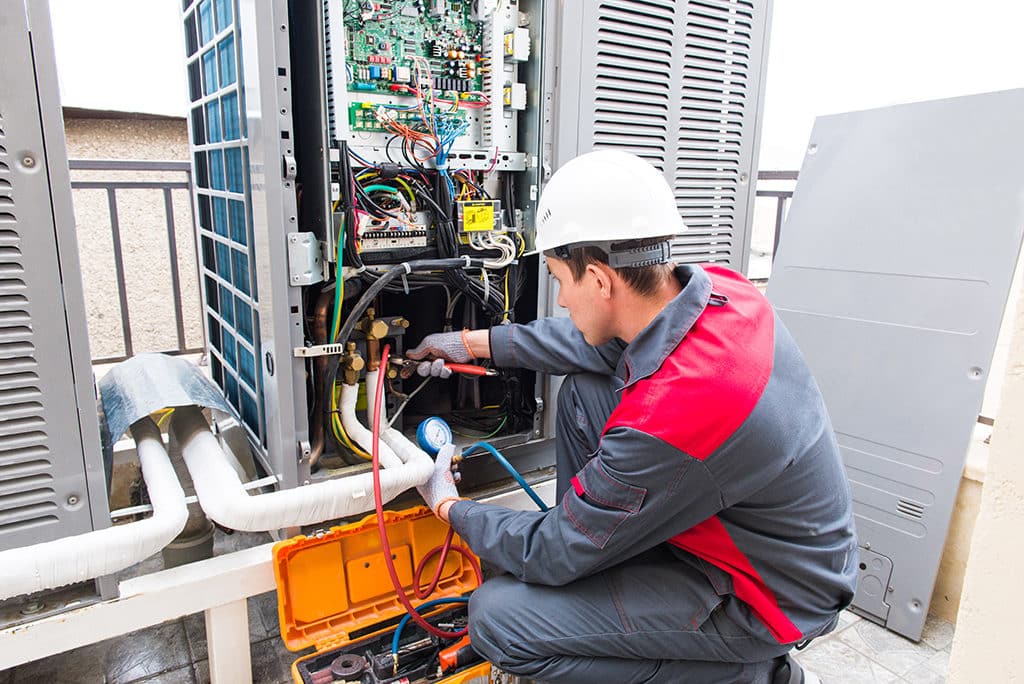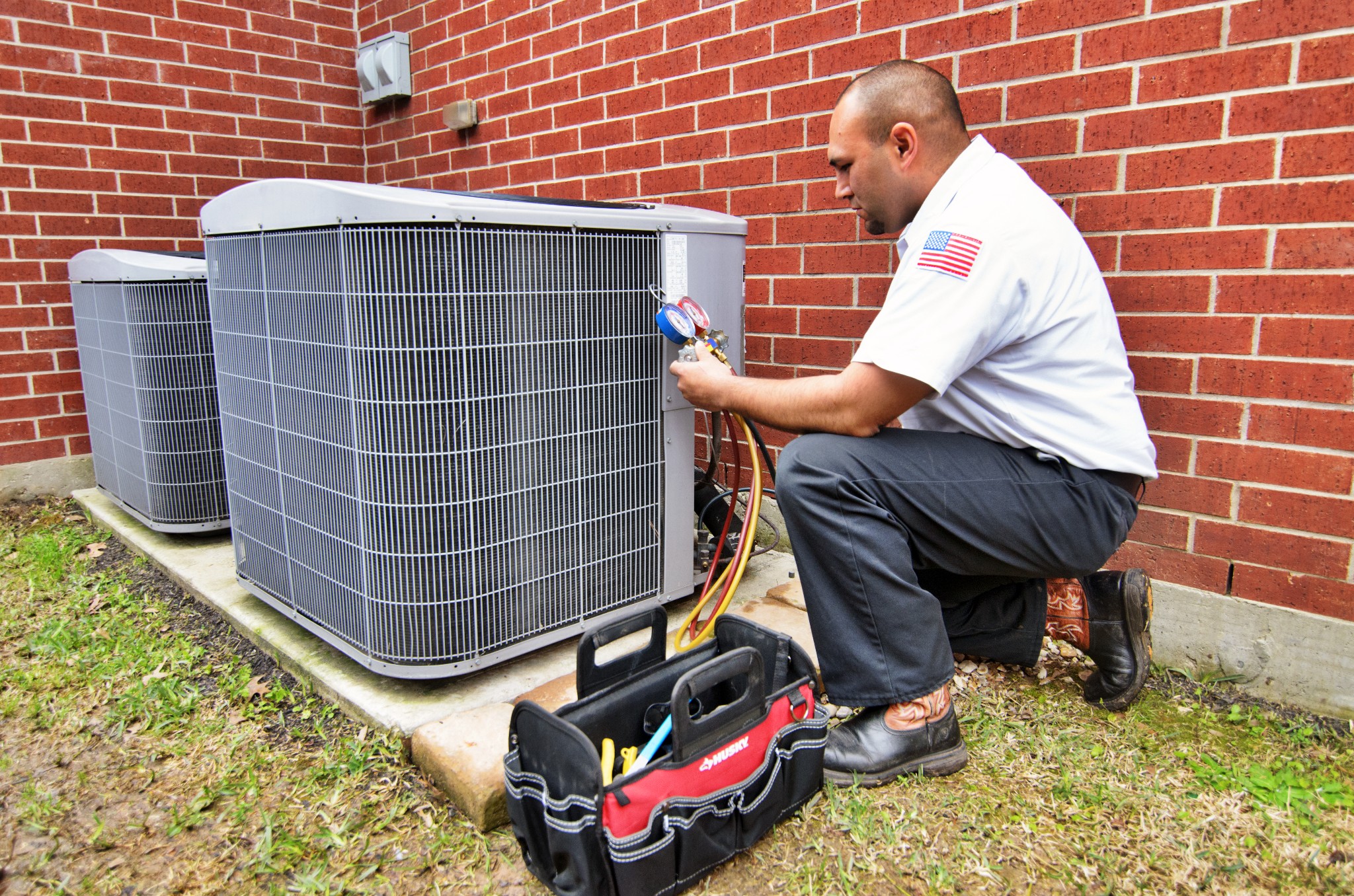Imagine your air conditioning system as a master carver, skillfully carving away at the oppressive warm in your house, leaving behind an awesome, comfortable oasis. Have you ever before asked yourself just how this contemporary marvel achieves such an accomplishment?
The elaborate dancing of cooling agents, coils, compressors, and ducts all work in harmony to create that invigorating blast of cold air. But just how specifically do these elements integrated to produce that much-needed respite from the blistering heat?
Allow's reveal the internal functions of ac system and debunk the scientific research behind staying cool.
Trick Takeaways
- Reliable Air conditionings utilize refrigerants to absorb and release warm, improving air conditioning and power efficiency.
- Routine maintenance makes sure optimum efficiency, durability, and power savings.
- Proper sizing and design prevent power waste and make certain even cooling distribution.
- Comprehending air flow characteristics and optimization improves cooling performance and convenience degrees. ac not turning on
The Basics of A/c
Recognizing the basics of a/c can greatly improve your understanding of exactly how these systems run efficiently. Energy performance is a vital facet of cooling, as it not only impacts your power expense but likewise the atmosphere. Efficient ac system use less energy to cool down a space, making them affordable and green. By purchasing an energy-efficient device, you can delight in a comfy interior atmosphere while reducing your carbon footprint.
Humidity control is another necessary function of air conditioning. Ac unit aid regulate the moisture degrees in your house, creating a more comfy ambience. Excess moisture can lead to mold development and discomfort, while low humidity degrees can create dry skin and respiratory system problems. A properly maintained air conditioner can successfully manage humidity, ensuring a healthy and pleasurable living environment for you and your household.
Comprehending exactly how air conditioning systems take care of energy effectiveness and humidity control can assist you make informed decisions when picking and using these systems in your house.
Recognizing Cooling Agents and Their Duty
When it comes to air conditioners, comprehending cooling agents and their function is necessary. You'll learn more about the importance of refrigerants in cooling systems and how they help with the heat transfer process.
Furthermore, taking into consideration the ecological influence of cooling agents is necessary for sustainable air conditioning solutions.
Function of Refrigerants
Cooling agents play a vital role in the procedure of ac unit by helping with the transfer of warm. The effectiveness of a refrigerant directly affects the cooling process and energy intake of the system.
When considering cooling agents, it's essential to consider their efficiency versus their ecological ramifications. Some cooling agents contribute to ozone deficiency and global warming, motivating the look for greener alternatives. Sustainable measures focus on searching for cooling agent options that are energy-efficient and have very little ecological influence.
Suppliers are progressively investing in establishing brand-new refrigerants that line up with sustainability goals. By prioritizing refrigerant effectiveness and checking out sustainable options, the air conditioning sector intends to minimize its carbon impact and decrease environmental injury.
Ecological Impact Factors To Consider
Taking into consideration the environmental impact of refrigerants is critical in examining the sustainability of cooling systems. When evaluating the ecological effects of a/c, two vital factors to take into consideration are energy performance standards and carbon footprint evaluation.
- Energy Effectiveness Specifications:
- Energy-efficient air conditioners take in much less power, decreasing general energy consumption and environmental effect.
- Carbon Impact Evaluation:
- Conducting a carbon impact evaluation aids in recognizing the amount of greenhouse gas exhausts associated with air conditioning operations.
- Refrigerant Choice:
- Going with refrigerants with reduced International Warming Prospective (GWP) can significantly decrease the ecological effect.
- Correct Disposal:
- Guaranteeing proper disposal of old refrigerants avoids them from harming the atmosphere.
- Routine Maintenance:
- Regular upkeep of a/c systems can enhance efficiency, lowering energy intake and ecological effect.
The Refine of Heat Transfer
When your ac system runs, it relies on a process of warm transfer to cool your area effectively. This device entails the absorption of heat from the indoor air and the exchange of thermal power to preserve a comfortable temperature.
Recognizing this vital element aids you comprehend exactly how air conditioning system effectively regulate the environment in your home.
Warm Absorption Device

To effectively cool down the air in your area, air conditioning unit use a warm absorption mechanism that effectively transfers warm. This device plays an important function in maintaining temperature level law and utilizing advanced air conditioning innovation.
Here's how the heat absorption process works:
- Refrigerant Flow: The refrigerant soaks up heat from the interior air.
- Compression: The compressor enhances the stress of the refrigerant, creating its temperature to increase.
- Condensation: The hot, pressurized cooling agent launches warmth outside as it condenses right into a liquid.
- Growth Shutoff: This component lowers the refrigerant stress, triggering it to cool off and vaporize.
- Evaporation: As the cooling agent vaporizes, it absorbs warm from the indoor air, beginning the cycle over again.
Thermal Power Exchange
In the process of thermal energy exchange, warmth transfer plays an essential duty in how ac unit function to cool down interior areas efficiently. Thermal dynamics determine that warm constantly flows from a warmer area to a cooler one. Air conditioners take advantage of this concept by removing heat from interior air and launching it outside, utilizing refrigerants to assist in the transfer.
Efficient thermal energy exchange is vital for the energy effectiveness of a cooling system. By enhancing warmth transfer procedures, a/c can cool down rooms effectively while minimizing energy usage. Recognizing the dynamics of warmth transfer is crucial for designing and operating ac system that give the desired degree of convenience without unnecessary power wastefulness.
Evaporator Coils and Their Function
Understanding the function of evaporator coils is essential to grasping just how ac system efficiently cool interior spaces. These coils play an essential role in the cooling process by absorbing heat from the indoor air, which is then circulated back as trendy air.
Right here are some key points concerning evaporator coils:
- Evaporator coil efficiency straight influences the cooling efficiency of the air conditioning system.
- These coils contain cooling agent that evaporates as it takes in warmth from the indoor air.
- As the refrigerant vaporizes, it changes from a fluid state to a gas, cooling the air in the process.
- The cooled down air is then dispersed throughout the space through the duct.

- Proper maintenance of the evaporator coils, such as normal cleansing, is necessary to assure leading efficiency and energy efficiency.
Compressor and Condenser Operations
Efficiently cooling down interior spaces involves recognizing just how the compressor and condenser interact in an air conditioning system. The compressor plays a pivotal role in the cooling process by pressurizing the cooling agent gas, boosting its temperature and power level. This high-energy gas then streams to the condenser, where it releases warm to the surrounding environment, causing it to condense into a high-pressure fluid.
The condenser further cools this fluid with warm exchange with the outdoors air, transforming it back into a low-pressure gas. This procedure improves energy performance and boosts the system's cooling power. Temperature law is attained as the cooling agent cycles with these system elements, absorbing heat inside your home and releasing it outdoors.

Air Ducts and Air Circulation
To optimize air flow and guarantee consistent air conditioning throughout your space, proper setup and upkeep of duct are crucial. Guaranteeing that your air ducts are made successfully and in a way that advertises suitable airflow dynamics is essential for the general performance of your cooling system. Ventilation techniques play a considerable function in keeping indoor comfort degrees, so it is necessary to take note of the following:
- Duct Style: Appropriately created duct help ensure that great air gets to every corner of your space successfully.
- Airflow Characteristics: Understanding exactly how air moves through the air ducts can aid you determine any kind of prospective concerns that may interfere with the air conditioning process.
- Regular Maintenance: Keeping your air ducts tidy and devoid of blockages is essential for preserving air movement and system efficiency.
- Sealing Leaks: Ensuring that there are no leaks in your ductwork assists stop amazing air from getting away, enhancing energy efficiency.
- Stabilizing Air flow: Appropriately stabilizing the air movement in different rooms can assist preserve consistent cooling throughout your office or home.
Regularly Asked Concerns
Exactly how Does the Size of an Air Conditioner Affect Its Effectiveness and Cooling Capability?
When choosing an a/c, keep in mind that size issues. An unit that's too tiny might battle to cool your area successfully, while a large one could squander power and not dehumidify correctly. Guaranteeing appropriate sizing factors to consider will certainly boost efficiency and cooling capability.
The right size straight impacts efficiency, assisting you stay comfortable without unneeded expenses. So, when it concerns a/c, remember size for finest performance and cooling down power.
What Are Some Usual Upkeep Tasks That Can Assist Boost the Lifespan of an A/c?
Normal maintenance tasks can significantly prolong the life of your air conditioning system. Remember to change filters to ensure appropriate airflow and tidy coils to enhance cooling efficiency.
Additionally, calibrate your thermostat for precise temperature analyses and inspect the refrigerant degrees for finest efficiency.
Can Air Conditioners Be Utilized together with Various Other Air Conditioning Methods, Such as Fans or Dehumidifiers?
Yes, you can enhance your cooling experience by integrating your a/c unit with followers. This cooperation can assist circulate great air better, giving an extra comfy atmosphere and possibly conserving energy.
In addition, utilizing a dehumidifier together with your a/c unit can increase cooling down efficiency by minimizing moisture levels, making your space feel cooler.
Take into consideration these alternatives to maximize your air conditioning setup and boost your general convenience during hot days.
Exist Any Kind Of Environmental Problems Related To using Air Conditioners, and Just How Can They Be Mitigated?
When using air conditioning system, bear in mind environmental concerns like power usage and greenhouse gas exhausts.
To mitigate these issues, consider sustainable cooling approaches and environmentally friendly choices.
You can lower the effect of a/c by utilizing energy-efficient designs, maintaining them on a regular basis, and integrating various other cooling down techniques like followers or dehumidifiers.
What Developments Are Being Made in Cooling Modern Technology to Make Devices Much More Energy-Efficient and Environmentally Friendly?
To make air conditioners more energy-efficient and green, advancements like clever modern technology and environment-friendly attributes are being established. These developments focus on raising power savings and minimizing environmental influence.
By integrating smart technology, air conditioning units can enhance performance based upon use patterns. The use of green materials and elements additionally contributes to making these units more sustainable.
These innovations intend to improve efficiency while minimizing the eco-friendly impact of a/c technology.
Final thought
So, currently you know exactly how a/c unit work!
From the cooling agents circulating via the system to the warmth transfer procedure, each component plays a vital duty in maintaining you cool.
The evaporator coils absorb heat, the compressor and condenser release it, and the air ducts distribute the amazing air throughout your room.
Next time you turn on your air conditioning, keep in mind the science behind all of it! Keep cool!
